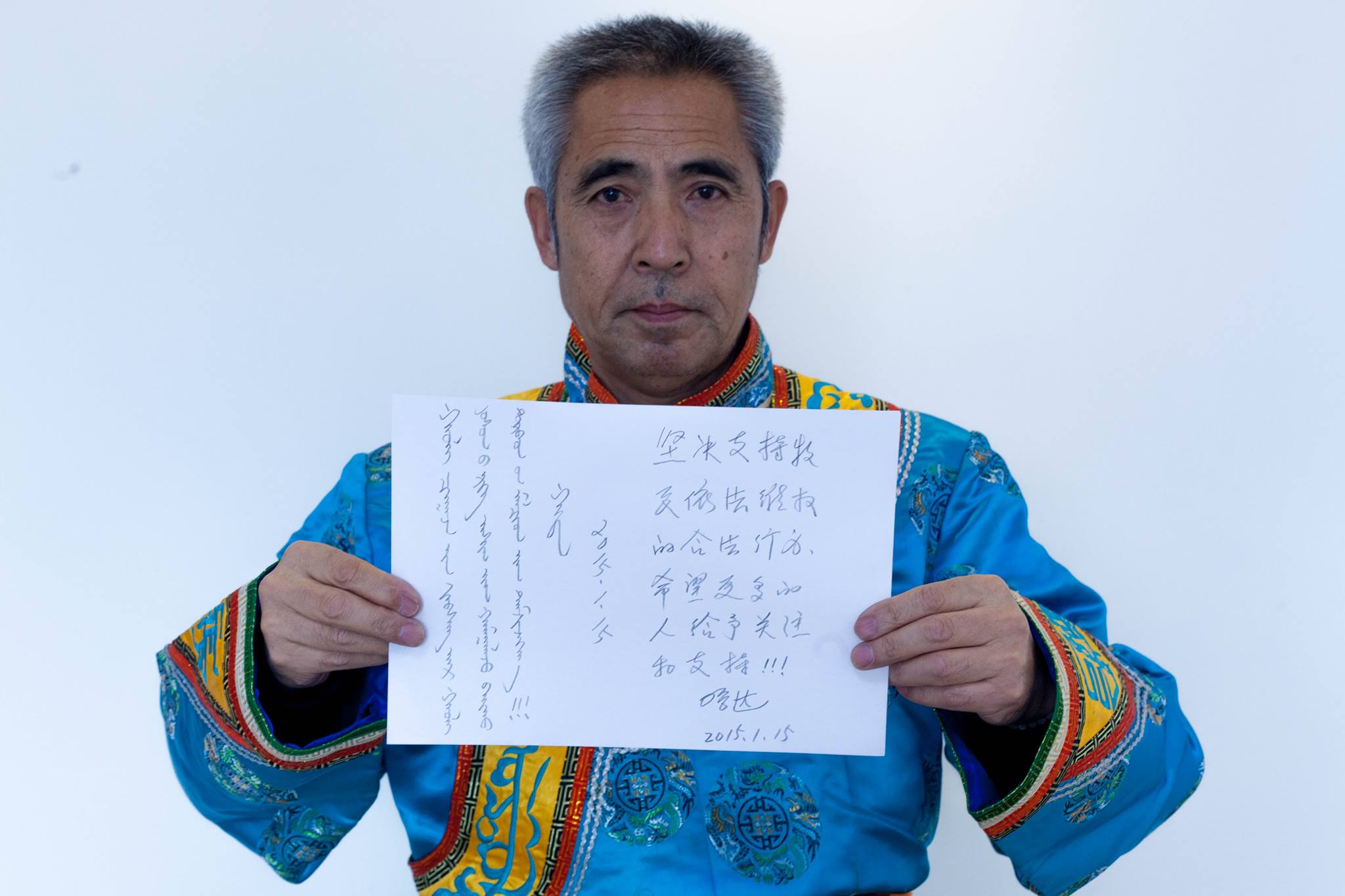From January 11 to 13, 2015, more
than 50 herders from western
Southern (Inner) Mongolia’s Durbed
Banner (“si zi wang qi” in Chinese),
and Sunid Right Banner ("su ni te
you qi" in Chinese) marched toward
Beijing. They are demanding Chinese
authorities halt the Zureh (“zhu ri
he” in Chinese) Military Training
Base’s illegal occupation of the
herders’ grazing land and end the
forced displacement of Mongolian
herders from their lands. Mr.
Davshilt, one of the protest
organizers, was questioned by local
public security personnel and
threatened with harsh punishment if
he continued activities.
“Davshilt’s freedom has been
restricted due to his activism and
strong organizing skills. He is
barred from traveling to Beijing and
blocked from social media outlets, ”
a close friend of Davshilt told the
Southern Mongolian Human Rights
Information Center (SMHRIC).
The pictures sent from the herders
protesting in Beijing show the
herders, including several elderly
women in traditional Mongolian
garments, holding hand-written
appeals (in both Mongolian and
Chinese) urging the Chinese
authorities to answer the following
demands:
1. To stop the illegal military and
local government occupation and
appropriation of herders’ grazing
lands;
2. To conduct a thorough central
government investigation into the
Zureh Military Training Base’s land
appropriation;
3. To halt the authorities’ forced
and violent displacement of
Mongolian herders from their lands;
and
4. To ensure that rural herders’
basic rights are not violated.
Mr. Hada, prominent political
prisoner who was released from a
“black jail” after serving a 15-year
imprisonment and a 4-year
extrajudicial detention, also sent
out a statement to urge the Chinese
authorities to protect Mongolian
herders’ legal rights. In his
statement, Hada asks the Chinese
government to:
1. Give justice to rural herders by
carrying out a thorough
investigation of the Zureh Military
Training Base criminal acts and
bringing those criminals to justice;
2. Adopt a legal mechanism to
guarantee similar cases will not
happen again; and
3. Respond appropriately to herders’
grievances and correct local
authorities’ illegal actions to
prevent Southern Mongolia’s frequent
ethnic conflicts, including the
escalating murder rates of herders.
Beijing-based lawyer Mo Shaoping
expressed his willingness to assist
the herders in filing a lawsuit
against the local authorities and
the Zureh Military Training Base.
Chinese official reports show the
Zureh Military Training Base
occupies more than 1,066 square
kilometers of Durbed and neighboring
Shiliin-gol League’s grazing lands.
Based off written communications
from the affected communities last
year, the SMHRIC counted a total of
708 Mongolian herder households
consisting of 2,907 individuals who
were forcefully relocated from their
grazing lands to “immigration
villages” near their respective
Banner capitals. Neither proper
compensation nor adequate housing
was provided to the relocated
herders.
In an effort to halt the military
base’s destruction of their grazing
lands, local herders carried out
multiple protests near the base and
appealed to various levels of the
government, including the central
government. All appeals were
ignored, and protesters were
forcefully dispersed.
In March 2013, led by Durbed Banner
government officials, the local
public security personnel arrived in
the regional capital of Hohhot to
block the herders from travelling to
Beijing and making an appeal to the
Chinese National People’s Congress.
The public security personnel
physically assaulted protestors
before taking them back to their
homes.
“We have been complaining to the
local authorities for years,” stated
a herder in a web chat group, “if
they continue to ignore our plight,
we will stage a coordinated
large-scale demonstration across the
herders’ communities.”






 Beyond
Great Walls: Environment, Identity, and Development on the Chinese
Grasslands of Inner Mongolia
Beyond
Great Walls: Environment, Identity, and Development on the Chinese
Grasslands of Inner Mongolia China's
Pastoral Region: Sheep and Wool, Minority Nationalities, Rangeland
Degradation and Sustainable Development
China's
Pastoral Region: Sheep and Wool, Minority Nationalities, Rangeland
Degradation and Sustainable Development The
Ordos Plateau of China: An Endangered Environment (Unu Studies on
Critical Environmental Regions)
The
Ordos Plateau of China: An Endangered Environment (Unu Studies on
Critical Environmental Regions)